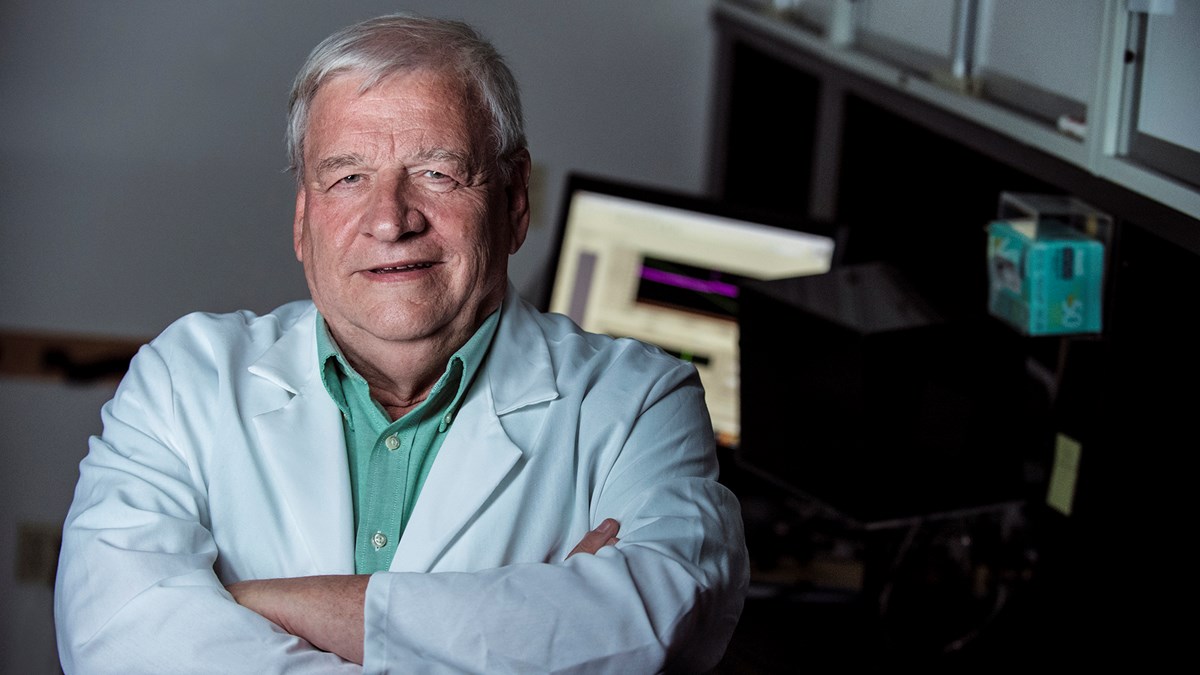Michael McCawley
Honorary:, PhD

Science needs to be done in the public interest and given the opportunity to find the truth. It's important to the people of the state of West Virginia.
From underground coal dust to out of this world (literally) moon dust, Michael McCawley, Ph.D., has spent almost 50 years studying how tiny particles affect health outcomes.
A clinical associate professor in the Department of Occupational and Environmental Health Sciences and member of the WVU Cancer Institute research programs, McCawley has taught at West Virginia University since 1979. Much of his professional career also included an appointment with the U.S. Public Health Service and Centers for Disease Control and Prevention’s National Institute for Occupational Safety and Health (NIOSH), located on the WVU Health Sciences campus in Morgantown.
Prior to retirement from NIOSH and the U.S. Public Health Service with the rank of Captain (O-6), McCawley traveled the world as an industrial hygienist working on the front lines of public health – fighting disease, conducting research and caring for people in underserved communities. In Washington state, he worked on projects involving volcanic ash exposures in communities following the eruption of Mount St. Helens. In Kuwait, he studied exposure to smoke from the oil fires following the Gulf War. Traveling to China, he investigated the carcinogenicity of silica in industries. Back in the United States, he researched exposure to diesel particulate and its subsequent health effects for underground miners, and ways to prevent chronic beryllium disease, especially in nuclear weapons workers.
“I got my first major disaster when I was sitting in a scientific conference in Houston, Texas, on a Monday morning,” he recalls. “They got up at the plenary session and said: ‘Mount St. Helens has just erupted. And the state of Washington would like to hear from anyone who knows anything about sampling dust around volcanoes.’ I looked at the guy sitting next to me and I said: ‘Who in their right mind is going to go sample dust around an active volcano?’ The next week my boss brought me in and told me, ‘You will.’ I just put the danger out of my head. In fact, that’s what I did throughout most of my career. I just knew it was going to be interesting.”
During his service, he was awarded the U.S. Public Health Service’s Commendation Medal, two Unit Citation Medals and a Foreign Service Medal, as well the American Industrial Hygiene Association’s David L. Swift Award for Outstanding Aerosol Paper of the Year, and the NIOSH Alice Hamilton Award for Engineering and Physical Sciences Research and was nominated for CDC's Charles Shepherd Award.
Now, McCawley’s work is focused mainly in West Virginia communities on issues related to Marcellus Shale drilling and mountain top mining.
In 2015, McCawley began work with the Marcellus Shale Energy and Environment Laboratory (MSEEL) project. The goal of the project was to provide a long-term field site to develop and validate new knowledge and technology to improve recovery efficiency and minimize environmental implications of unconventional resource development. Throughout the five-year project, McCawley would be able to provide real time data related to air, noise, occupational safety and health monitoring.
McCawley is a frequent contributor to federal and state agencies and lawmakers, and is a passionate advocate for the people of West Virginia.
Appearing before U.S. House Subcommittee on Energy and Mineral Resources in 2019, McCawley discussed his research showing a causal relationship between mountain top mining and an increased prevalence of disease. One of the only scientists studying ultrafine particles that are less than one-thousandth of the width of a human hair, he says these particles created by mining cause inflammation which is associated with nearly all chronic disease.
When a National Academy of Sciences study focusing on health impacts of mountaintop removal and other surface mines was canceled, McCawley again spoke up for the residents of Appalachia.
“Science needs to be done in the public interest and given the opportunity to find the truth. That's important to the people in the southern portion of West Virginia; it's important to the people of the state of West Virginia.”
But WVU and the School of Public Health’s involvement with incidents related to health and the environment in the state wasn’t always apparent. In 2014, shortly after the School had been established, a chemical spill occurred in the Elk River in Charleston. McCawley was part of a commission the state organized to study the spill and what could be done to combat the resulting public health crisis.
“When all of it started, it was not clear what the School of Public Health’s role was going to be,” he said. “In fact, the Elk River Spill really helped define that. Now, if there’s something going on in the state related to health and environment, WVU and the School of Public Health are going to be there and we are going to be part of it. We will have our hands up in the air the first time they ask for volunteers.”
As for moon dust, McCawley served on the Dust Risk Standing Review Panel for the National Aeronautics and Space Administration (NASA). After risk to human health from exposure to lunar dust was identified during the Apollo missions, the Human Research Program at NASA's Johnson Space Center began conducting research and developing strategies to mitigate the effects of long-duration spaceflight on astronauts.